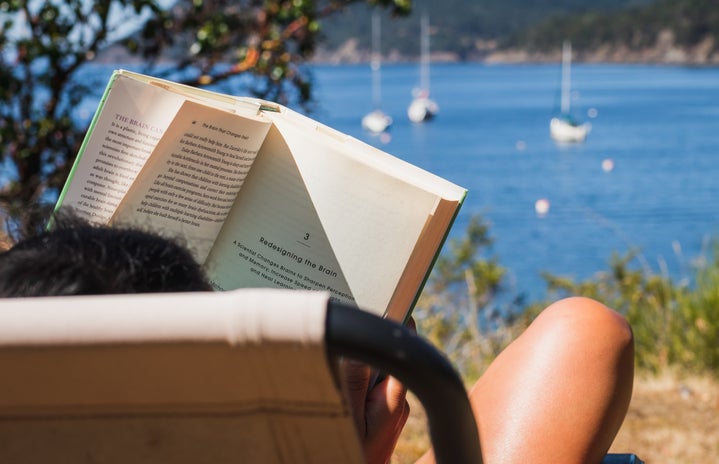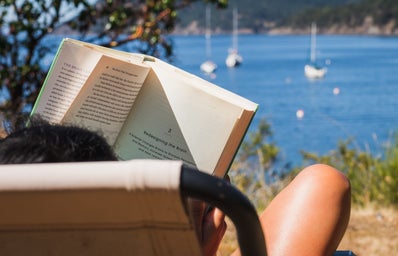“And so with the sunshine and the great bursts of leaves growing on the trees, just as things grow in fast movies, I had that familiar conviction that life was beginning over again with the summer” – The Great Gatsby, F. Scott Fitzgerald
I was most excited about the break for the chance to catch up with good friends and some good books. Here are some of my favorite reads for their associated memories from the past summer:
The Picture of Dorian Gray (1890) by Oscar Wilde
Fulfilling my dark academia aesthetic, while admittedly drawn to the indirect benefit of a main character with a similar name, this classic was at the top of my must-read list. I wanted to read this because I had heard homoeroticism is found within this work. From the annotated and uncensored version, I learned that the witty author served time for his queerness.
Without spoiling the story, the writing is sexy, thanks to the gorgeous Dorian and provocative Henry. My favorite topics in the novel were vanity, elitism and temptation – all of which create a great mindset entering hot girl summer.
A quote I liked: “The only difference between a caprice, and a life-long passion, is that the caprice lasts a little longer.”
Exciting Times (2020) by Naoise Dolan
Initially meant to be a read reserved solely for the drive to and back from my trip to Las Vegas, this novel’s premise and main character had me taking advantage of still moments to read more.

Despite the love triangle trope, I interpreted the bisexual protagonist’s main conflict to be choosing between maintaining an image of herself versus learning to be comfortable in love and vulnerability. I related to some of her worst moments as an occasionally sarcastic and self-loathing young adult navigating unfamiliar territory with the potential of personal growth. Especially with the mention of compulsory heterosexuality, I felt validated and understood.
Every queer person who’s been taught to hate parts of themself should read this novel. I can’t stop thinking about it.
This piece of contemporary fiction touches on the topics of race, class and linguistics, which was met with criticism.
A quote I can’t shake: “You keep describing yourself as this uniquely damaged person, when a lot of it is completely normal. I think you want to feel special – which is fair, who doesn’t – but you won’t allow yourself to feel special in a good way, so you tell yourself you’re especially bad.”
Norwegian Wood (1987) by Haruki Murakami
I’ve seen this novel on many Booktube and #booktok recommended reading lists and it’s not escaping this one.
This is the epitome of a book in which nothing really happens but has great prose and complex characters that ground you to the story. The genre might classify as romance but the novel truly explores loss and navigating relationships. Through its markings of tragedy, I’m left considering the narrator’s nostalgia – exploring Japan, having devoted and plentiful love, and expressing himself sincerely without an aim to cause anyone harm.
A quote to demonstrate the lovely writing: “even if we hadn’t met that day, my life might not have been any different. We had met that day because we were supposed to meet. If we hadn’t met then and there, we would have met somewhere else sometime. I didn’t have any basis for thinking this: it was just a feeling.”
The Bell Jar (1963) by Sylvia Plath
I swear I did try to have a good summer – hot girls are basically complex female characters! I felt hopelessly drawn to this book in which, again, not much technically happens.
To me, this novel marks how this was the summer I pursued therapy. I recognized myself in the main character and recognized some of my friends in her. I felt completely sucked into the mental downward spiral of Esther Greenwood. The vague ending, with the knowledge of Plath’s fate, leaves me with a hazy feeling of hope. I fully understand why it is a feminist classic.
A quote that’s too relatable: “because wherever I sat—on the deck of a ship or at a street café in Paris or Bangkok—I would be sitting under the same glass bell jar, stewing in my own sour air.”
The Purpose of Power: How We Come Together When We Fall Apart (2020) by Alicia Garza
The organizer behind the Black Lives Matter hashtag, Garza, helps the reader understand that a movement is beyond one person or one moment. I admire this nonfiction work precisely because Garza says not to admire or celebritize her. As an organizer, she makes herself replaceable and stresses the need to implement radical political ideology in interpersonal relationships and individual interactions, all in the effort to sustain change.
She reviews BLM movement’s presentation of contradictions in the pursuit of justice. How can justice be served with a criminal justice system that swallows people whole and affects everyone who comes into contact with it? I fully appreciate how #BLM brought prison abolition support to the mainstream.
This book took me the longest to digest because of its story-telling, heavy topics, and advice.
A quote to consider: “Solidarity can never be expressed by hearing someone’s pain and then turning the conversation back to yourself.”
A quote for organizers: “And while I feel most comfortable around people who think like me and share my experiences, the longer I’m in the practice of building a movement, the more I realized that movement building isn’t about finding your tribe – it’s about growing your tribe across difference to focus on a common set of goals.”
I received this book as a gift from one of my favorite involvements at UC Irvine, ACTIVE, a facilitator training program centered around social justice. So big thank you to Yessi and Dr. Marcela! UCI students can become involved with the ACTIVE program (Winter-Spring). Since applications come out during the Fall Quarter, I suggest joining the mailing list to keep tabs on the Cross-Cultural Center for applications to this directed group study.
Reading can be a form of activism – but it’s only the first step. Connecting with others to share the values of liberation is organizing praxis.
To draw upon the wise words of Audre Lorde, stay engaged by taking necessary rests; it’s self-preservation. While a vehicle for education, books also pose as a method for self-care. Reading is good for your mental health by providing space for introspection and even mental vacations via escapism.
I hope you enjoyed my recount of personally impactful summer reads. Through books, my summer had countless stories.
Honorable mentions:
The Great Gatsby by F. Scott (Or was it Zelda?) Fitzgerald
My Year of Rest and Relaxation by Ottessa Moshfegh
Please DM if you’d like to connect on Goodreads.
Thank you for reading. Take care!


